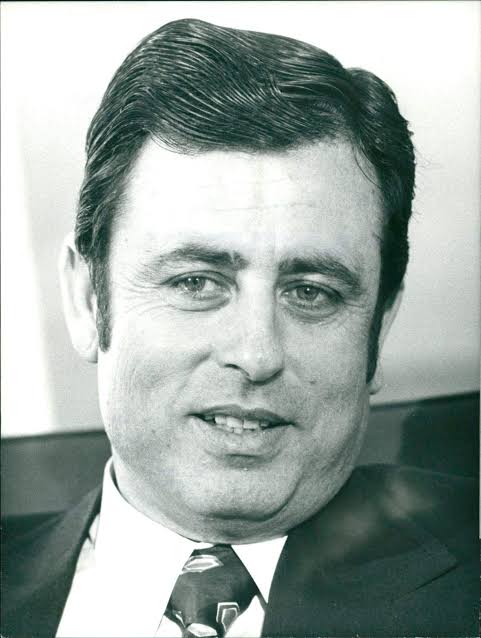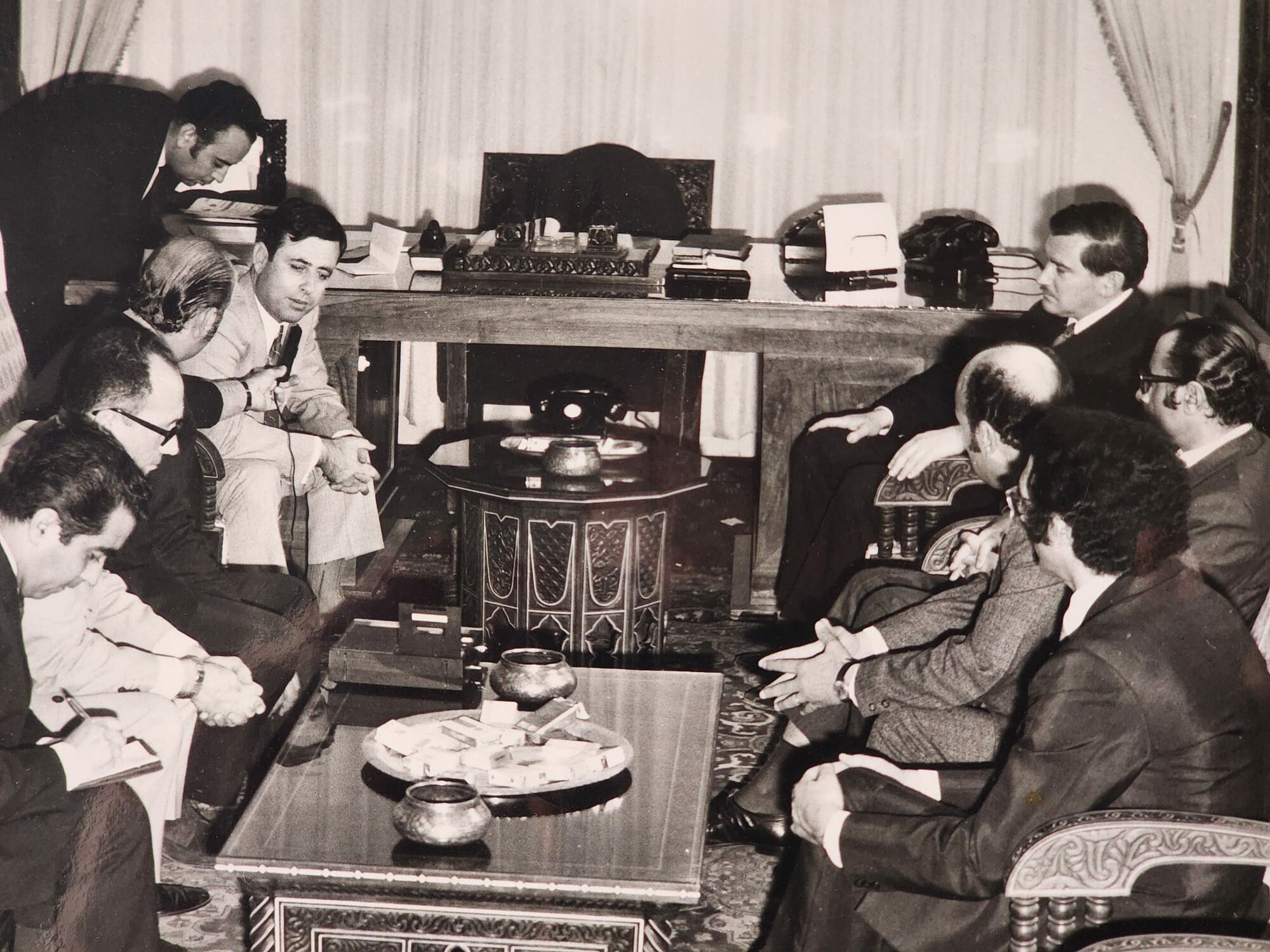On October 26, 1977, Al-Qabas newspaper reported an assassination attempt on Abdul Halim Khaddam (the then-Syrian Foreign Minister) at Abu Dhabi Airport. Accompanied by Saif bin Ghabash, they were heading to board Khaddam’s Syrian plane. Gunfire erupted as they approached the exit, and Khaddam swiftly reached the VIP lounge, avoiding the bullets. Saif bin Ghabash was shot three times and succumbed to his injuries. The assailants, three in number, fled the scene, with one Palestinian, aged 19 and born in Baghdad, captured wearing a traditional garment during the attack.
The failed attempt unfolded as follows, according to news agencies:
After concluding talks with officials in Abu Dhabi, Abdul Halim Khaddam and Saif bin Ghabash headed to the airport to board the private Syrian plane bound for Doha on the fourth leg of Khaddam’s Gulf tour.
Upon reaching the exit gate, gunfire erupted from the upper balcony, targeting the ministers. Khaddam quickly ran to the VIP lounge, entering it before being hit. Saif bin Ghabash, however, was struck by three bullets—one in the shoulder and two in the abdomen—and fell, covered in blood.
The exact number of attackers was initially unknown, but security personnel immediately responded to the gunshots, securing the reception hall. The gunman rushed through the airport, firing his weapon towards security forces. He then took seven workers hostage, demanding a plane for departure to an unspecified location.
Sheikh Hamdan bin Mohammed, Deputy Prime Minister, Sheikh Mohammed bin Rashid, Minister of Defense, and Ahmed Khalifa Al-Suwaidi, the Foreign Minister, arrived at the airport. Armed patrols and security forces surrounded the airport, preventing entry and exit, while journalists covering Khaddam’s departure were restricted in their movements. The airport was closed to air traffic.
As security patrols arrived, an ambulance transported Saif bin Ghabash to the military hospital in a comatose state. He was immediately taken to the operating room, where he eventually passed away.
The assailant surrendered, and Khaddam was informed of his identity.
Officials rejected the assailant’s request, engaging in negotiations with him for an hour and a half. Afterward, he announced his surrender. About fifteen minutes later, Mr. Khaddam received a small note believed to contain the name and identity of the assailant. The Syrian minister immediately contacted senior officials in the United Arab Emirates (UAE), expressing regret for such an incident in the UAE, which “hosts all the sons of the Arab world.”
Khaddam demanded the disclosure of the culprits and remained under tight security at the airport. He made calls to the Syrian ambassadors in Doha and Bahrain, apologizing for discontinuing his tour. He also instructed the Syrian ambassador in Abu Dhabi to inform Damascus of his decision, cut short his tour, and return to the Syrian capital. Khaddam waited at the airport until a UAE private plane arrived to take him to Damascus. His empty plane, which he arrived in from Kuwait, departed for the Syrian capital. After his departure, senior officials in the UAE left the airport, while security forces and the military headed to the location where the assailant was detained. The airport was reopened to international navigation.
According to reports, the assailant arrived at the airport as an ordinary person, heading towards the lounge. He fired shots from the upper balcony, where usual greeters and farewells stand. These individuals typically avoid inspection.
Upon entering the lounge, Khaddam and Bin Ghabash were fired upon from the upper balcony, about five meters away. Khaddam swiftly ran to the VIP lounge, escaping unharmed. However, his colleague fell, fatally wounded. It was initially reported that there were three assailants, with two managing to escape.
Bin Ghabash’s funeral is scheduled for today in Ras Al Khaimah. Abu Dhabi Radio interrupted its programs in the early afternoon, starting to broadcast the Quran. Dubai and Sharjah radio stations followed suit, preparing for the announcement of the sad news.
At 2:30 PM, Sheikh Zayed bin Sultan, the President of the UAE, announced the death of Saif bin Ghabash. In his condolence statement, Sheikh Zayed expressed deep regret for the loss and extended sympathy to the people of the UAE, the Arab nation, and the Islamic world. He prayed for the deceased, asking for mercy, a place in heaven, and patience and solace for his family. The statement concluded with “To Allah we belong and to Him, we shall return.”
The UAE Cabinet held an emergency meeting at 7 PM to discuss the assassination attempt and the death of Saif bin Ghabash, deciding on security measures, including the removal of suspicious elements taking advantage of UAE’s hospitality. The funeral procession from the Grand Mosque in the capital to Ras Al Khaimah was also discussed.
Upon his return to Damascus, Khaddam was quoted by the Middle East News Agency saying, “The group that attempted the assassination came from Baghdad.” The assailant fired about 27 shots from a Canadian-made machine gun at Khaddam, expressing deep sorrow for Ghabash’s death. Khaddam accused an “Arab capital” of orchestrating the assassination attempt, claiming that those responsible knew it served the Israeli enemy primarily.
Khaddam expressed his extreme regret and sorrow for the death of Saif bin Ghabash, calling it a loss not only for the UAE but for the entire Arab nation. He praised Ghabash as one of the best nationalists in the Arab world, emphasizing his significant contributions to Arab and nationalist causes.
Khaddam discussed his mission in the Gulf countries, conveying messages from President Hafez al-Assad about the current situation and the need for solidarity among Arab nations. He mentioned that the leaders of these Gulf states delivered positive responses to Assad, sharing Syria’s views on the importance of unifying the Arab stance and mobilizing efforts to face the challenging times ahead.
Assad congratulates Khaddam, and Hussein offers condolences to Zayed.
President Assad congratulated Mr. Khaddam on his survival and expressed his regret for the martyrdom of Saif bin Ghabash. Upon his return to Damascus, the Syrian president received his foreign minister, listened to a report on the results of his tour, and received response messages from King Khalid bin Abdulaziz, the Amir of Kuwait, and the President of the UAE.
King Hussein called President Assad last night, congratulating him on Khaddam’s survival and expressing his condemnation of this heinous incident and the unethical means of violence and terrorism within the framework of the unified Arab nation.
King Hussein also sent a condolence message to Sheikh Zayed, expressing the Kingdom’s strong condemnation for the treacherous act committed by sinful hands against the Arab cause and interest.
Kuwait condemns the attempt and mourns the UAE.
Kuwait’s Foreign Minister, Sheikh Sabah Al-Ahmad, condemned the assassination attempt on Mr. Khaddam and expressed his regret for the death of Saif bin Ghabash as a result of this attempt. He described the assassination attempt as a heinous crime that no Arab should accept. He emphasized that it was a chaotic and hideous operation, serving only the forces hostile to the Arab nation.
Sheikh Sabah made a phone call yesterday with senior officials in the UAE government to inquire about the latest developments in the incident, which caused dismay among Kuwait’s political and diplomatic circles, as well as foreign and Arab diplomatic circles in Kuwait. These circles expressed their concern about the dimensions of the incident.
Mr. Abdulaziz Hussein, the State Minister for Cabinet Affairs, stated that Kuwait shares the painful situation with the UAE and said, “We condemn these means that create concern and confusion among us. The late Saif bin Ghabash was a virtuous young man with high morals, cultured and literate, one of the best young people in our Arab nation. We share the grief with the UAE, the family of the deceased, and the Arab world, considering the deceased a great loss.”
Said Nofal: The incident benefits only the enemy.
The incident also provoked condemnation and pain in most Arab capitals. Dr. Said Nofal, the Assistant Secretary-General of the Arab League, stated that this heinous act only benefits the enemy seeking to weaken the Arabs from within and divert their efforts from focusing on confronting the Israeli enemy and liberating the occupied land and restoring the national rights of the Palestinian people.
3 assassination attempts.
The assassination attempt that Syrian Foreign Minister Abdelhalim Khaddam survived yesterday at Abu Dhabi Airport is the third within two years. The first attempt took place in 1976 in Lebanon when the Syrian minister’s car was subjected to a hail of automatic weapon fire while traveling from Beirut to Damascus during one of his numerous trips between the Lebanese and Syrian capitals to mediate in Lebanese events.
In December 1976, Khaddam survived a second assassination attempt. Returning with his wife from the summer resort of Zabadani, a motorcycle approached his car, and the rider fired six shots at him, two of which hit the minister in the shoulder and hand, while the third wiped the back of his head. The “Black June” organization claimed responsibility for the incident, and Syrian authorities arrested one of the masterminds, Ibrahim Al-Bouri, identifying his accomplices.
Saif Ghabash… The international intellectual.
Saif Saeed bin Ghabash (48 years old) was one of the prominent figures in the UAE government. He spoke English, Russian, German, Italian, and French fluently. He completed his higher and university studies in Baghdad, Moscow, and Paris. He was a father of four children, and his late wife was of Russian origin.
The late State Minister served as the mayor of Ras Al Khaimah until he was appointed as the Deputy Minister of Foreign Affairs in the first independent government formed in 1971. In 1972, Sheikh Zayed bin Sultan appointed him as the Minister of State for Foreign Affairs in the federal government, a position he held until today.
Valdheim condemns and denounces the assassination of Saif bin Ghabash.
New York – Al-Qabas
Dr. Kurt Valdheim, the Secretary-General of the United Nations, expressed his deep regret and pain at the news of the assassination of Saif bin Ghabash, the State Minister for Foreign Affairs of the UAE. He said, “I knew him personally and was greatly affected by the painful news.” The Secretary-General condemned terrorist acts and the increasing violence in the world. Valdheim sent a condolence message to the UAE on behalf of the United Nations.




